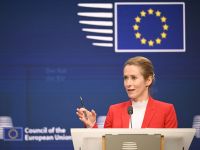Kuwait's Status as an “AI Practitioner” Presents Opportunities in Building a Future-Ready Ecosystem: BCG Study

Kuwait has been recognized as an “AI Practitioner” in a recent study by Boston Consulting Group (BCG). This positions the country among 30 forward-looking economies actively integrating AI across key sectors, according to the report titled "GCC AI Pulse: Mapping the Region’s Readiness for an AI-Driven Future" by BCG.
The report, based on BCG’s 2025 AI Maturity Matrix, revealed that Kuwait has earned the designation of AI Practitioner alongside 30 economies worldwide, including Qatar, Bahrain, and Oman. The maturity matrix identified four economic archetypes based on their AI readiness, ranging from AI Emergents at the lower end of the scale, followed by Practitioners, then Contenders, and Pioneers at the high end. With GCC countries yet to achieve AI Pioneer status, which includes the likes of the US, UK, and China, the report highlights substantial opportunities for advancing AI readiness and leadership in the region.
Dmitry Garanin, Managing Director and Partner, BCG, said: "Kuwait’s commitment to integrating AI across pivotal sectors showcases a visionary stride towards digital transformation. The National AI Strategy underlines a significant ambition that, if supported by a concerted effort in skilling, policy innovation, and targeted investment, can transform Kuwait into a regional AI powerhouse. The challenge now is to evolve from strategy to execution, ensuring that initiatives like the AI Center of Excellence and enhanced data governance frameworks lead to tangible outcomes. Bridging the current gaps in investment and research is crucial for Kuwait, not just to catch up, but to lead."
Building a Competitive Edge in the Digital Era
The Kuwait National Strategy for Artificial Intelligence, developed by the Central Agency for Information Technology (CAIT), outlines a comprehensive framework to responsibly harness AI for national development to help advance Kuwait’s AI goals under Kuwait’s Vision 2035. It emphasizes building a robust digital infrastructure, fostering AI talent, and ensuring ethical governance. The strategy aims to enhance public services, boost economic diversification, and position Kuwait as a regional leader in AI innovation. It also includes recommendations for policy, education, and collaboration with international partners to ensure sustainable and inclusive AI adoption across sectors.
Efforts to build AI capabilities include the National Skilling Program, which focuses on training government employees, though expanded initiatives are needed to cultivate a robust AI workforce. On policy and regulation, Kuwait is developing an AI governance framework to ensure ethical and responsible AI implementation. While there exists a $7 billion public fund for SMEs, it does not specifically allocate resources to AI, revealing the necessity of targeted financial investment.
To accelerate research and innovation, Kuwait plans to establish an AI Center of Excellence that fosters AI studies and collaboration between academia and industry, though additional measures are required to scale innovation. In terms of infrastructure, the country is enhancing its cloud and AI ecosystem, with Microsoft and Google Cloud spearheading efforts to build AI-powered data centers.
However, Kuwait’s progress across various AI dimensions remains uneven, as illustrated by key metrics: ambition scores the highest at 5, while investments and research lag at 0.67 and 0.33, respectively. To improve AI readiness, Kuwait needs to strengthen data governance, increase investments in startups, and intensify workforce development initiatives.
"Kuwait’s emergence as an AI Practitioner is a critical first step in the broader journey towards becoming a leader in the AI domain. The stark contrast between its ambitious goals and the current state of skills, investment, and innovation underscores a pivotal moment for policy and decision-makers. By doubling down on developing a deep talent pool, fostering a vibrant AI startup ecosystem, and ensuring responsible AI deployment, Kuwait has the potential to set a benchmark for AI integration not only regionally but globally. The foundation is set; now is the time for bold, decisive action to leverage AI for sustainable growth," said Dr. Lars Littig, Managing Director and Partner at BCG.
Approaches to Foster AI Maturity in the Gulf
BCG’s GCC AI Pulse report supports the strategic advancement of national visions aimed at enhancing countries’ global competitiveness. The expansion of the AI talent pipeline through dedicated upskilling programs and the acquisition of global talent will broaden the existing talent pool and infuse the regional market with international expertise and perspectives, critical for innovative leaps in AI.
In addition, governance structures must be realigned to better adhere to evolving AI ethics frameworks and international standards, ensuring responsible and sustainable AI development. Advancements in policies will solidify Kuwait’s reputation as a leader in ethical AI practices, a benchmark against which global counterparts are measured.
Moreover, there is significant room for intensifying research and development investments to foster stronger academia-industry collaborations. This will spur innovation and cement Kuwait’s position as a hub for cutting-edge technological advancements, matching and potentially surpassing global AI leaders such as the US, China, Singapore, the UK, and Canada in certain areas.
Background Information
The Boston Consulting Group
BCG began not as another management consulting firm but as a pioneer of bold, new approaches to running a company.
Helping organizations make the changes needed to seize competitive advantage—and to win—has always been BCG’s raison d'être. Since 1963, we have been helping leaders and their organizations build lasting advantage. The independent spirit handed down from Bruce Henderson, BCG's founder—always challenging the status quo—has given the firm the courage to look beyond the obvious to find solutions for more than 50 years.






